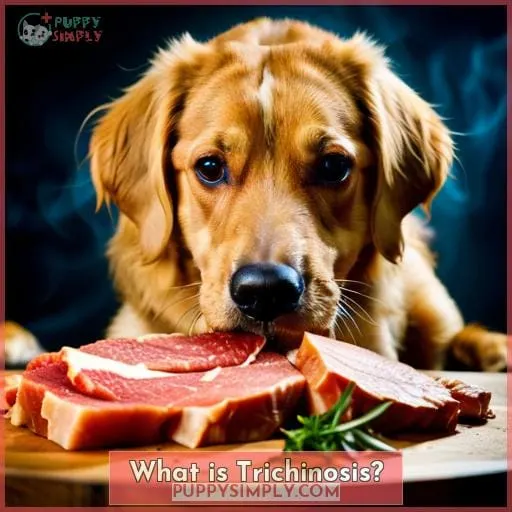This site is supported by our readers. We may earn a commission, at no cost to you, if you purchase through links.
Dogs naturally prefer meat-based diets, and most commercial dog foods contain ingredients like chicken and beef. But did you know that pork is actually good for your pup? Many owners are curious about whether their furry friends can eat raw or cooked pork safely.
The truth is, with the right preparation, plain cooked pork can be a healthy addition to your pet’s diet. However, there are risks associated with feeding them uncooked or undercooked meats too! It’s important to understand what trichinosis is and how it affects dogs, so you know if it’s safe for them to consume raw or preserved options such as ham and bacon.
Table Of Contents
- Key Takeaways
- Is It Safe for Dogs to Eat Pork?
- Can I Feed My Dog Raw Pork?
- What is Trichinosis?
- What Are the Symptoms of Trichinosis?
- Can I Give My Dog Pork Bones?
- Is Preserved Pork, Such as Ham and Bacon, Safe for My Dog to Eat?
- What Raw Meat is Safe for My Dog to Eat?
- Can My Dog Eat Cooked Pork?
- Frequently Asked Questions (FAQs)
- Conclusion
Key Takeaways
- Dogs should not be fed raw pork meat due to the risk of trichinosis, a parasite that can cause severe illnesses.
- Cooked plain pork, without any seasoning, can be safely consumed by dogs in moderation.
- Processed pork meats like ham and bacon should be avoided as they are high in fat and salt, which can lead to pancreatitis and other health issues.
- Pork bones should not be given to dogs as they can cause internal damage.
Is It Safe for Dogs to Eat Pork?
It’s important to be aware that although many dogs can safely enjoy cooked pork as an occasional treat, raw pork meat is not recommended due to the risk of trichinosis and other health issues.
Trichinella larvae are a parasite found in undercooked or raw pork which may cause infection if ingested by humans or animals. The World Health Organization warns against eating this type of meat without proper preparation, such as cooking it at high temperatures for several minutes beforehand.
Additionally, nutrition-wise, pigs contain fatty acids that can be difficult for some dogs to digest, leading them prone to indigestion and pancreas inflammation problems in the long run. Moreover, they could suffer from allergies when exposed too much. So it’s better to avoid feeding your pet with pig-related products like bacon and ham, as these tend to come with added saltiness which could lead to even more severe complications like bloat or pancreatitis.
Therefore, poultry might represent a safer alternative, providing essential nutrients while being easy on digestion. Veterinarians also recommend boiled chicken, especially when dealing with gastrointestinal issues among mammals such as our beloved furry friends.
Can I Feed My Dog Raw Pork?
It’s important to be aware that raw pork meat can be dangerous for your dog. Trichinella larvae, a parasite found in undercooked or raw pork, can cause infection if ingested by either humans or animals.
Nutrition-wise, pigs contain fatty acids which may be difficult for some dogs to digest and lead to indigestion and pancreas inflammation over time. Additionally, they could suffer from allergies when exposed too much. They may also experience more severe complications like bloat or pancreatitis due to the saltiness of processed meats such as bacon and ham.
It is best not to feed any type of uncooked pork meat but instead opt for poultry like boiled chicken.
What is Trichinosis?
You may have heard of trichinosis, a potentially dangerous parasite that can infect you and your pet if ingested through uncooked or undercooked pork. It is caused by the larvae of the trichinella roundworm, which can lead to severe health complications in both humans and animals.
Symptoms of infection include fever, muscle pain/weakness, fatigue, and nausea – all signs that should be taken seriously.
Pork safety includes not only avoiding raw meat but also being aware of allergies as well as nutrition when it comes to this fatty food source.
A better alternative would be boiled chicken – plain unseasoned – providing essential nutrients without having difficulties digesting it; especially important when dealing with gastrointestinal issues among mammals like our furry friends!
What Are the Symptoms of Trichinosis?
Signs of trichinosis in both humans and animals include fever, muscle pain/weakness, fatigue, and nausea – all indications that should not be ignored. A person can contract this serious infection if the larvae of the Trichinella spiralis roundworm are present in a piece of pork they have consumed.
To prevent this from happening, it’s important to properly cook any pork-based dish to avoid severe symptoms associated with trichinosis.
Blood tests may also be recommended by your doctor or veterinarian for diagnosis after initial symptoms appear. Treatment options depend on how quickly treatment begins but generally involve anti-parasitic medications as well as supportive care such as fluids and rest prescribed by a qualified professional.
Safe handling practices when preparing food containing raw or undercooked pork are essential for reducing risks associated with trichinosis infections too! To ensure optimal safety, always wash hands before eating; use separate cutting boards; clean utensils used for preparing meats thoroughly; keep raw meat away from other foods during storage & cooking processes; refrigerate leftovers promptly!
By following these tips, you can help protect yourself and your pet against potential health complications caused by consuming infected pieces of pork without even realizing it!
Can I Give My Dog Pork Bones?
Though pork bones may be appealing to your pet, they can present a serious health hazard if consumed. Digestion issues, allergic reactions, and fat content are all factors that should be taken into account when considering feeding pork bones to your dog.
Dental bones or muscle meat from beef is recommended instead of raw diets, as undercooked meat poses the risk of trichinosis, and sharp pieces can cause internal damage.
It’s important not only to monitor any adverse effects but also to take precautions before feeding these potentially hazardous treats in order to ensure safety for both you and your furry friend!
Is Preserved Pork, Such as Ham and Bacon, Safe for My Dog to Eat?
Moving on from pork bones, preserved pork like bacon and ham are also popular treats. However, these products may not be as safe for your pup as you might think. Not only can they lead to pancreatitis due to their high fat content, but they could also contain the parasite Trichinella spiralis larvae, which cause trichinosis in dogs.
If consumed by a juvenile dog, this can lead to an elevated white blood cell count or even seizures if left untreated. To ensure safety when feeding preserved pork products such as bacon and ham, it is important that proper storage techniques are followed.
Alternative proteins should also be considered for those pups who may have meat allergies or difficulty digesting fatty foods.
What Raw Meat is Safe for My Dog to Eat?
As a pet owner, you may be curious whether raw meat is safe for your dog to eat. Well, it depends on the type of meat – chicken and beef are generally considered safe if they are fresh and not spoiled or contaminated.
However, one should avoid feeding raw pork as it can contain harmful parasites such as trichinosis, which could cause serious illnesses in dogs with weaker immune systems.
Chicken
Providing your pup with a healthy alternative to pork, chicken is an easily digestible source of essential nutrients. Cooked chicken can be served as both a treat and part of their meal plan for omnivorous animals like dogs.
Raw beef and uncooked pork should never be fed due to the risk of parasites or bacteria in these meats, but plenty of safe bones are available for chewing enjoyment! Boiled chicken is especially recommended by veterinarians if your pup has any allergies or difficulty digesting fatty foods, such as those found in preserved pork products like bacon and ham.
The life cycle of Trichinella spiralis larvae can also contaminate raw meat, which makes it unsafe for consumption.
Beef
Beef is a great way to provide your pup with essential nutrients while avoiding the potential risks of raw pork meat. Feeding it safely requires that you look out for subtle symptoms like unusual thirst or digestion issues.
Boiled beef should be served at least 10% of the time in any dog food diet as it helps avoid allergies and supports better digestion.
Can My Dog Eat Cooked Pork?
You can safely offer your pet cooked pork, as long as it’s plain and not seasoned with any condiments. It is important to be aware of the risks associated with feeding pork to your dog.
- Nutrition: Pork is relatively low in essential amino acids compared to other meats like chicken or beef, making it a less than ideal choice for providing balanced nutrition.
- Digestion Issues: Too much fat in the diet can cause digestive issues such as indigestion and pancreatitis inflammation.
- Allergic Reactions: Always check for potential allergic reactions when introducing new foods into their diet.
Pork should always be cooked thoroughly before consuming – raw or undercooked pork carries an increased risk of trichinosis which could lead to severe illnesses if left untreated. Cooking will also reduce fat content which may help prevent digestion issues caused by too much consumption of fatty foods like bacon or ham (which are not recommended).
Alternatives meats such as chicken provide more complete nutrition without posing the same health risks that come along with eating raw meat products; veterinary nutritionists recommend boiled unseasoned chicken for dogs suffering from gastrointestinal problems due to its easy digestibility and high amount of essential nutrients needed in a canine diet.
In addition, dental bones made specifically for pets are good alternatives over traditional pork bones because they pose no threat towards internal damage while still helping maintain healthy teeth & gums!
Frequently Asked Questions (FAQs)
How much pork can I safely give my dog?
You should avoid giving your dog raw or undercooked pork, as it can contain the parasite trichinosis. Cooked pork is safe to feed in moderation, but be sure to check for any allergic reactions and ensure there are no added condiments.
What foods should I avoid giving my dog if they have eaten pork?
If you’ve fed your pup pork, avoid processed meats like ham and bacon. These are high in fat and salt, which can lead to pancreatitis or bloat.
What other meats are safe for my dog to eat?
Other safe meats for your pup include plain, cooked beef and chicken. Remember, every dog is different – introduce these new proteins gradually and keep an eye out for any reactions.
Is there a way to tell if pork is cooked thoroughly enough for my dog to eat?
To ensure pork is cooked thoroughly enough for your dog, look for an internal temperature of 145°F (63°C). Additionally, make sure to check that the juices are clear and not pink or bloody.
Are there any other health risks associated with feeding my dog pork?
Yes, feeding your dog pork can also lead to indigestion and pancreatitis. Additionally, raw or undercooked pork carries a risk of trichinosis, which can cause various symptoms in dogs with weaker immune systems.
Avoid processed meats like bacon and ham due to their high fat and salt content.
Conclusion
In conclusion, it’s important to remember that pork can be an important part of a dog’s diet, but it must be prepared correctly. Raw pork is not safe for dogs to eat as it may contain the parasite Trichinosis.
Pork bones are also not safe for dogs and should be avoided. Processed pork meats like ham and bacon are not recommended as they’re high in fat, salt, and can potentially cause pancreatitis in dogs. As an alternative, chicken is a great source of protein for dogs and can be safely prepared in a variety of ways.
Ultimately, it’s important to consult with your veterinarian before introducing new foods into your dog’s diet.















